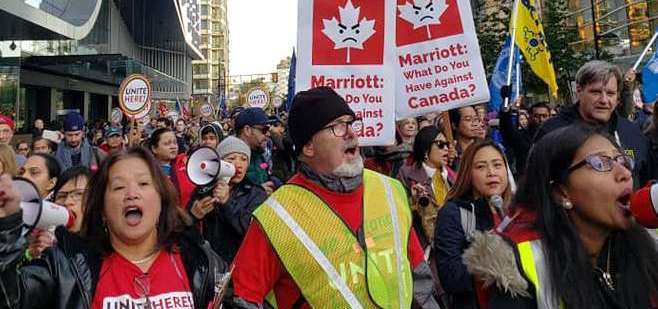
No. 31October 11, 2019
|
Current Struggles in Defence of Rights
Vancouver Hotel Workers’ Strike

Hotel workers employed at four downtown Vancouver luxury hotels are continuing their militant strike struggle in defence of their rights and dignity after a court order issued on October 3 limited the striking workers’ ability to disrupt hotel operations and inform the public about their just demands.
On October 10 hundreds of striking hotel workers and their supporters rallied and marched in front of the Marriott Parq Hotel. Marriott is the owner of the Pinnacle Harbourfront Hotel, one of the hotels whose workers are on strike. Amongst the numerous unions present at the rally were UNITE HERE Local 40, Teamsters, International Longshore and Warehouse Union, BC Teachers’ Federation, Hospital Employees’ Union, Health Sciences Association, BC Government and Service Employees Union (BCGEU) and the Public Service Alliance of Canada. A post on the UNITE HERE Local 40 Facebook page on the rally declared: We have the power! Vancouver is OUR city!

At an October 8 press conference organized by Unite Here Local 40 outside the Marriott-owned Westin Bayshore Hotel, BCGEU President Stephanie Smith announced that her union was making a $3-million interest free loan to the the hotel workers’ union.
The BC Federation of Labour has put its full weight behind the hotel workers. On October 9, it called on all its affiliated unions to cancel bookings at the four hotels where workers are on strike and to avoid future events at the hotels.
The hotel workers are calling on other workers and the general public to support them as they are on the front lines fighting to stop the drive of rich private interests to push down the wages and working conditions as well as eliminate any semblance of job security for all workers.
 Workers employed at the Hyatt Regency, Westin Bayshore, and Pinnacle Harbourfront hotels, represented by UNITE HERE Local 40, walked off the job on September 19 after fourteen months of bargaining with negotiators representing the hotels. Outstanding issues include workload, safety and job security. Large and loud picket lines were immediately set up outside the three hotels. Three days later the strikers were joined on strike by about two hundred workers employed at the Hotel Georgia, which the owners claim to be the number one hotel in Canada. These workers belong to a separate bargaining unit of Local 40. Their demands are similar to the other workers plus they are demanding a guaranteed end to on the job sexual harassment by hotel management and customers.
Workers employed at the Hyatt Regency, Westin Bayshore, and Pinnacle Harbourfront hotels, represented by UNITE HERE Local 40, walked off the job on September 19 after fourteen months of bargaining with negotiators representing the hotels. Outstanding issues include workload, safety and job security. Large and loud picket lines were immediately set up outside the three hotels. Three days later the strikers were joined on strike by about two hundred workers employed at the Hotel Georgia, which the owners claim to be the number one hotel in Canada. These workers belong to a separate bargaining unit of Local 40. Their demands are similar to the other workers plus they are demanding a guaranteed end to on the job sexual harassment by hotel management and customers.
On October 7 activists from Renewal Update visited all four picket lines, holding discussions with workers and distributing copies of the September 25 issue of Renewal Update which contained an article on the strike. Several workers told Renewal Update that the outcome of the October 21 federal election will make no difference to them. No matter what the outcome workers must continue to defend their rights and fight for acceptable wages and working conditions. Large numbers of striking workers marched in front of the hotels shaking noise makers and banging on pots, accompanied by a drummer. They chanted slogans such as: One Day Longer, One Day Stronger!; What Do We Want? Respect! When Do We Want It? Now!; No Contract. No Peace. No Justice. No Peace.
A striking room attendant at the Pinnacle Harbourfront Hotel was quoted in the Vancouver Sun as saying “We want to make noise because we want the public to know this is what we are fighting for and we deserve a fair contract. They think if they take our noise makers we are going to stop striking. That’s not going to happen.” Sharon Pawa, spokesperson for UNITE HERE Local 40, stated in a union press release: “We will abide by this decision (court order) and continue to demonstrate and strike for standards that will transform the way that rich corporations and developers treat workers in Vancouver. All our members understand there is going to be hardship. We need to make some sacrifices but this is about our future.”
(Photos: UNITE HERE)
Protest in Sudbury Against Ford Government’s Funding Cuts

 Protesters lined both sides of Kelly Lake Road in Sudbury near the restaurant where Ontario Premier Doug Ford was holding a $600 a plate fundraising dinner on October 3. Parents and families of children with autism demanded a reversal of the Ford government’s changes to the Ontario Autism Program. They were joined by members of several unions, including CUPE, OPSEU and UFCW, as well as other members of the community. They called for an end to the Ford government’s cuts to education and its attacks on public-sector workers. Education workers who had been on a work-to-rule demanding a negotiated settlement were among those attending.
Protesters lined both sides of Kelly Lake Road in Sudbury near the restaurant where Ontario Premier Doug Ford was holding a $600 a plate fundraising dinner on October 3. Parents and families of children with autism demanded a reversal of the Ford government’s changes to the Ontario Autism Program. They were joined by members of several unions, including CUPE, OPSEU and UFCW, as well as other members of the community. They called for an end to the Ford government’s cuts to education and its attacks on public-sector workers. Education workers who had been on a work-to-rule demanding a negotiated settlement were among those attending.
“The focus of our protest is the announcement that Child and Community Resources (CCR) made [September 17] that they will no longer be able to offer fee-for-service [autism services] for our kids,” said Sara Kitlar-Pothier, an organizer of the event stated, speaking to the Sudbury Star. “Child and Community Resources, they are the main service provider.” CCR offered services to families across the Sudbury, Manitoulin, Algoma, Thunder Bay, Kenora and Rainy River districts, the autism alliance said, noting that the more northerly communities will be more seriously impacted.

(Photos: RU)
Health Professionals in the Outaouais Continue to Uphold Their Rights

Demonstration outside Gatineau Hospital, September 16, 2019.
On September 16 and 17, nurses at the Gatineau Hospital staged two sit-ins to denounce the compulsory overtime imposed by hospital management.
According to their Code of Ethics, nurses are the only ones who are qualified to decide whether they are capable of undertaking another work shift or not. In spite of this, management intimidated certain nurses, telling them they had “no choice,” that they had to be “supportive of their team” and that if they did not stay to provide care, patients would be endangered because of them.
 Also, on September 16, a demonstration was held by health professionals in front of the Gatineau Hospital as well as the Papineau Hospital in Buckingham, to denounce comments made by the executive director of the Centre intégré de santé et de services sociaux de l’Outaouais, who publicly implied that the high level of avoidable deaths in the Outaouais in recent years was not due to a lack of human and financial resources but rather to a lack of rigour and poor practices attributable to the employees.
Also, on September 16, a demonstration was held by health professionals in front of the Gatineau Hospital as well as the Papineau Hospital in Buckingham, to denounce comments made by the executive director of the Centre intégré de santé et de services sociaux de l’Outaouais, who publicly implied that the high level of avoidable deaths in the Outaouais in recent years was not due to a lack of human and financial resources but rather to a lack of rigour and poor practices attributable to the employees.
Health care is not recognized as a right in either Quebec or Canada, which reduce the people to a cost which should be done away with. The Canada Health Act stipulates that the federal government must, among other things, make sure that the health care provided in the provinces is universal and accessible. But this is devoid of meaning when subsequent federal governments simply cut transfer payments to the provinces and hold no provincial government to account, claiming it is not their jurisdiction. It reveals that in Canada rights are not enforced. Recent shortages and damages are in part attributed to the Harper government’s 2011 reduction of $36 billion in health transfer payments to the provinces over ten years. This has not been replaced by the Trudeau Liberals despite the problems which exist. Coupled with this are the threats of special legislation and fines used to intimidate health care workers who fight to defend the integrity of their profession and the public’s well-being.
Health care workers are a crucial part of the work which humanizes the social and natural environment. The demand to stop paying the rich and increase investments in health, education and social programs is more relevant than ever.
(Photos: FIQ)
Workers Speak Out About Their Concerns
Quebec Paramedics Deserve Respect
– Interview with Jean Gagnon, Pre-Hospital Sector Representative, Health and Social Services’ Federation, Confederation of National Trade Unions (CSN) –
Renewal Update: What are the latest developments in the struggle of paramedics in defence of their rights and in providing a service to the population?
 Jean Gagnon: There have been no developments for several months. We’re still waiting for the Ministry of Health to respect the commitments it made earlier. [Commitments made in 2017, at the time of the signing of agreements with CSN paramedics – RU Note].
Jean Gagnon: There have been no developments for several months. We’re still waiting for the Ministry of Health to respect the commitments it made earlier. [Commitments made in 2017, at the time of the signing of agreements with CSN paramedics – RU Note].
If we recall, the deputy minister at the time assured us that we would be provided yearly data on ambulance occupancy rates. In the case of the hourly schedules, once certain thresholds established by the Ministry were reached, more service hours were to be added.
There was also a commitment to eliminate the on-call schedules, in other words to turn them into hourly schedules, once the thresholds set by the Ministry had been reached. However, there has been no development on that issue. The Ministry is not honouring its commitments.
We were told recently that there could be a reform of Quebec’s ambulance system. This is a reform that was ordered following a report by Minister Hébert. [A 2013 report by Réjean Hébert, Minister of Health under the PQ government – RU Note]. We’ve known for years that there was going to be a reform, but even if one is on the horizon, and even if it comes very soon, nothing justifies the government not respecting its commitments, as the additional vehicles are needed on the road. If the paramedics’ field of practice is to be expanded and we are to be able to respond to more diverse calls, it will not come from adding more on-call schedules. This much must be understood.
RU: Can you explain what on-call schedules are and the problems they cause?
JG: On-call schedules began some 30 years ago, at a time when the ambulance system was just being developed. Paramedics on an on-call schedule are on duty 24 hours a day for seven days, after which they have seven days off.
In places such as the road to La Manic, where you are 250 kilometres away from civilization and the number of calls you receive is not necessarily very high, an on-call schedule is viable. But what we are talking about are areas where the population is dense, the frequency of calls very high, and where, on a recurring basis, teams must be taken off the road because they have been working for over 16 hours straight. Paramedics become very tired and that is when driving and patient care can be compromised. Those on-call schedules must be turned into hourly schedules.
RU: Why is it important to have regular data on the situation in the pre-hospital sector?
JG: Because the Ministry relies on data to determine the ambulance occupancy rate, both for hourly as well as on-call schedules. When the set thresholds have been reached, they must either transform the schedules or add vehicles to the hourly schedules.
Under our right to access to information, we have obtained indicators, or data, that show those set thresholds have been reached, but the Ministry has ignored the data. By not providing us with the data, the Ministry feels enabled not to transform the schedules or add vehicles.
RU: What repercussions have the non-respect of commitments had in the field?
JG: At present, the bond of trust between the paramedics and the Quebec government has been broken. The government is telling us that it is not really our employer. According to the government, we have to go through our private employers. Despite this, the government is asking us to participate in the reform of the sector and we have accepted. But what guarantee do we have that they will listen to our advice when reforming the program? They do not even respect the commitments they have already made!
RU: You have fought for several years to change your situation and you have very strong public support, yet even with that, the commitments the government made are not being respected.
JG: That’s right! We paramedics were criticized in the past for not necessarily doing things the right way. I would say that for more than a decade now, paramedics have tried to do things properly. But despite all the commitments made to us, we have seen no results. So people are really exasperated. And in particular, a bond of trust no longer exists. Our people are exhausted and it has become more and more difficult to maintain the service within those conditions of exhaustion.
RU: And the cases you are dealing with are becoming more and more complex.
JG: They are increasingly complex, and we are being asked to do more. Our intervention time is becoming longer. The population continues to age and vehicles are not being added. I understand there is going to be reform of the system because at a certain point they will say a limit has been reached in adding vehicles; we know that. However, the Ministry made a commitment to add vehicles and turn on-call into hourly schedules. We are not going to allow the fact that reform is coming to be used as an excuse to postpone the commitments the ministry has already made to us. It was because of those commitments that we were able to arrive at the agreements in 2017. If we had known that the government was not going to keep its word, we would never have ratified those collective agreements.
RU: In conclusion, can you briefly tell us what your demands are?
JG: We have known for a long time that reform of the pre-hospital sector is coming. We have several ad hoc committees set up. We are preparing a brief and at the appropriate time when the government is ready to hear us, we will be ready to make our recommendations. It would be premature to talk about it now. We will talk with you again when we have something new, before the holidays for sure.
Letters to the Editor
Addressing People’s Concerns
Generally speaking, when one meets and discusses with people about what’s going on in society, they’re a lot more advanced in identifying what the key political issues are than the representatives of the political parties in parliament, who talk all kinds of nonsense.
 For example, in the articles in Renewal Update on Lac Mégantic or those about people who want us to talk about employment insurance or regional development, there’s coherent political discourse. Meanwhile, the representatives of the political elite turn all the issues into personality conflicts and other diversions. One can see that this elite is completely disconnected.
For example, in the articles in Renewal Update on Lac Mégantic or those about people who want us to talk about employment insurance or regional development, there’s coherent political discourse. Meanwhile, the representatives of the political elite turn all the issues into personality conflicts and other diversions. One can see that this elite is completely disconnected.
The quality of the articles in Renewal Update must be emphasized. They’re short articles which in very few words find a way to go to the heart of the matter. Can one contradict what’s being said? In the article on Lac Mégantic, we learn that the rails are not being repaired, that the situation has gotten worse and that this could end up killing people. What is it that the representatives of the political elite do not understand? They’re cut off from their base. They’re caught up in other concerns, in their privileged reality in parliament that they’re trying to preserve. Theirs is not the reality of the concerns and defence of the people.
Renewal Update is doing important work by placing people’s concerns in the forefront and by giving a voice to workers and all those fighting for their rights.
A construction worker in Montreal
A Way to Move Forward to Solve Problems
The coverage of the fight of the crane operators in Quebec on matters that greatly concern not only their own safety, but the safety of the public, is important to further develop and carry during the election. While the fight is concentrated in Quebec, it has repercussions all over the country in construction and other industries where the motive of making maximum profit trumps the right of human beings to work and live in safe and healthy environments. The points are made clearly and show that many struggles the workers are waging are essentially political — they address the neglect of governments to do their duty which is a big problem today.
 Likewise the proposals of the Abitibi miner to develop ways to refine and process resources at home, rather than exposing workers and their communities to the ups and downs of the rip and ship-based extractive industry, contribute to a discussion of the economy that is very much needed in the election.
Likewise the proposals of the Abitibi miner to develop ways to refine and process resources at home, rather than exposing workers and their communities to the ups and downs of the rip and ship-based extractive industry, contribute to a discussion of the economy that is very much needed in the election.
The negative consequences of the current direction of the economy are being felt in many parts of the country. The miner’s reference to moving forward “with our own concerns and our own way of seeing things” arises from the working people’s own analysis of the conditions and the necessity for change.
The struggle of these workers, and their views of a way forward that serves the interests of working people, arise from their direct experience and thinking. This sharply contrasts with the hollowness of the campaigns and slogans of the cartel parties, which originate with the marketing firms of those who give no role whatsoever to the workers in determining what is the way forward for their particular sector or industry let alone Canada and its people.
A Reader in Windsor
(To access articles individually click on the black headline.)
Send your articles, photographs, reports, views and comments to editormlpc@cpcml.ca

